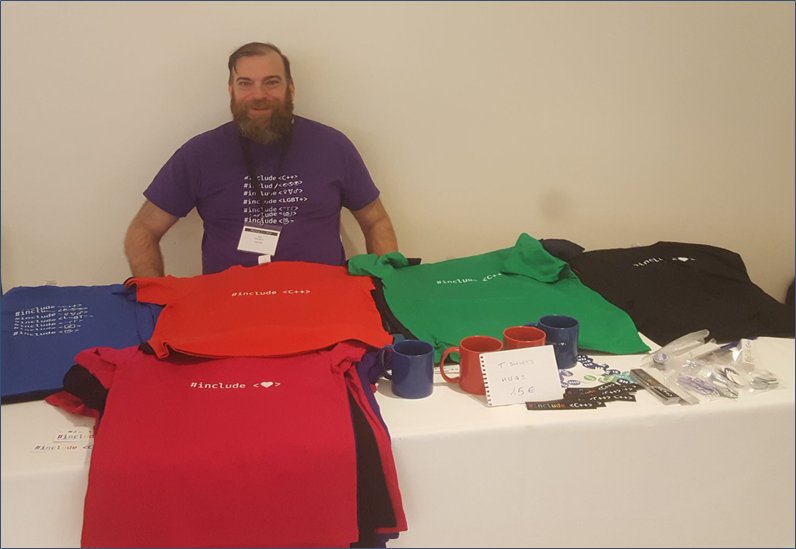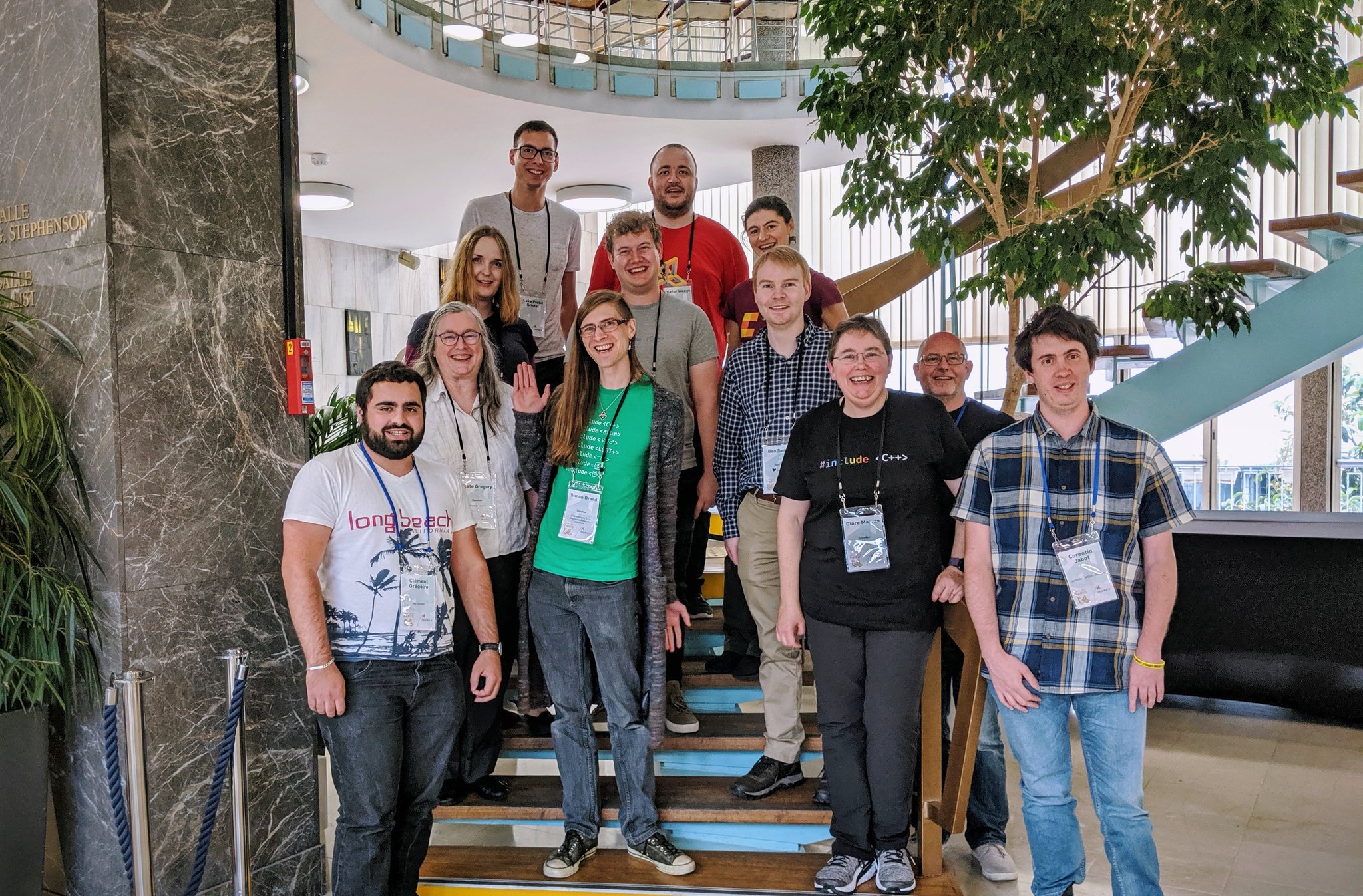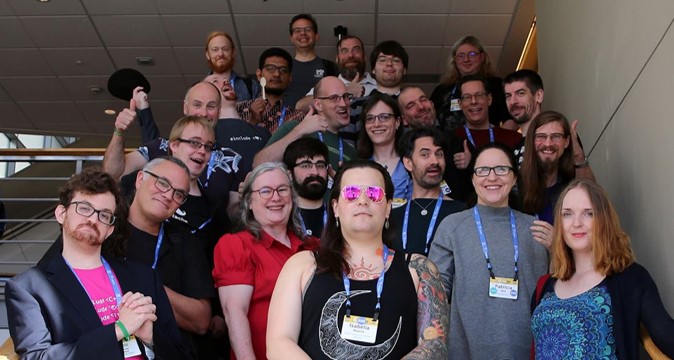On July 14th, 2017, Guy Davidson tweeted what he thought was a passing pun:

But when I saw the tweet, I thought, yeah, why isn’t there?
And in that moment, #include was born. We got together at CppCon and again at Meeting C++ where Guy did a lightning talk on inclusion. We were off and running. At that time we had a channel on the cpplang slack, but that didn’t work out well: a change of owners of the slack to someone who was less interested in preventing harassment and abuse, coupled with slack’s fundamental design tenet that people having trouble with bad behavior on a slack channel can always go to their mutual boss (which doesn’t work on public servers that bring strangers together) resulted in #include being pretty much driven off the slack and forming our own server elsewhere, on discord.
The original channels on the discord were all about the work of running #include. How can we get conferences to have a code of conduct? How can we help employers to write job ads that will attract all kinds of applicants, not just people who closely resemble the ones they already have? But we couldn’t stop talking about C++ so we added a channel for that, and then another for something else technical, and another, … and things really started to grow.
By April 2018 we were about a dozen organizers and very few people who weren’t organizers. But now we have over 2300 members and over 70 channels. People are getting help with C++ problems they face, recruiting helpers for projects, getting advice about speaking or attending conferences, and much more.
Our original goals were pretty low key really:
- To encourage under-represented people to speak, to apply for jobs, to stay in this industry
- To get conferences to have a code of conduct (we hadn’t even thought about enforcement)
- To get employers to value diversity somewhat, and to provide some resources to conferences and employers
We thought it would be nice to have some stickers and Tshirts made, and have a table at conferences where we would urge people to join our discord and try to make our industry more welcoming. Well, that worked! We’ve had tables at major C++ conferences the world over and you can be sure to find a smiling person to talk to, whether they’re officially “working the table” or not.


We’ve seen these shirts at conferences and user groups around the world, at C++ standards meetings, and on a lot of speakers and influencers. We think they send a strong message to attendees that the world is full of friendly and welcoming people who will not exclude you because you are different in some way. If you want one, we have a US-based store and a European store, or you can find us at a conference near you. We try to diffuse the stickers around the world – if you run a user group and are going to be at a conference, get in touch with one of us (the conference channel on our discord would be the best place) to see if you can get a handful of stickers to take home and give out at the group.
Last year at about this time, someone asked if we were interested in partnering with the Women in Tech Fund to get women to CppCon. We sure were! The conference donated tickets at below their catering costs, and we raised $4000 to cover travel and accommodation for our scholarship winners. It was a big success and we keep doing it at conference after conference. Right now we’re raising for CppCon again – this year not just women, but anyone who is under-represented in the C++ community, can apply. If your employer isn’t sending you, why not see if we can?

This is a lot more than we had originally planned to do. A number of us started insisting on a Code of Conduct before agreeing to submit talks to a conference, and suddenly it seems all the C++ conference have good Codes of Conduct now, with real enforcement too. There’s a best practice gaining popularity of introducing the Code of Conduct team at the start of the conference too. We started handing out pronoun stickers to put on badges, and not only do lots of people take them (please take one even if your gender is obvious, it makes life easier for those whose isn’t) but some conferences have even started including a pronouns field on badges. We’ve built this amazing friendly community on the discord where people are learning and growing and becoming leaders in the C++ community at large. We’ve seen talks and demos and forms and web sites changed after we pointed out that a particular wording or example wasn’t welcoming and inclusive. People generally want to be welcoming and inclusive, they’re just not sure how to do it, so our strategy of providing really specific unsolicited advice has worked well. And probably the thing I’m most proud of is the people – actual breathing humans – we have sent to conferences. Going to a conference is career-changing, especially when you’re relatively inexperienced. You can meet your heroes, ask questions, learn a ton, make connections, get advice, and re-energize your connection to this industry and your job. Already I am seeing former scholarship winners on stage, donating to the current fundraiser, and finding their voices on Twitter and our discord. It’s amazing. I want to pinch myself some days.
The people who form the core of #include support and encourage each other. Many of us have given talks we would never have otherwise given. I won’t speak for her, but I expect the jaw dropping and enlightening Deconstructing Privilege talk that Patricia Aas has been giving could be one of them. If you haven’t watched it, you should. A lot of what we’re doing at #include is “privilege lending” – using our positions to ask for things to make people with less privilege feel welcome. We’re also teaching people who’ve been spared some hardships about the realities some other people face. Often this is all it takes for things to change quite quickly.
We’ve also done a lot of lightning talks and internal corporate presentations about #include and what we’re trying to do, but it seems like none of them ever get recorded and uploaded. Rest assured, we’re still working hard to move the needle when it comes to inclusion in the C++ community.
What’s next? Well, we’d love to start seeing child care available at C++ conferences. We’d love to see other developer communities doing some of what we’re doing, and we’re going to keep learning from other developer communities too. We’re seeing things like quiet rooms, pronouns on conference badges, and food labelling becoming the norm. And we’d love to get suggestions from anyone who feels excluded from conferences, training, job opportunities, and online communities. Join the discord and join the conversation, or find us on Twitter. See you there!
Kate